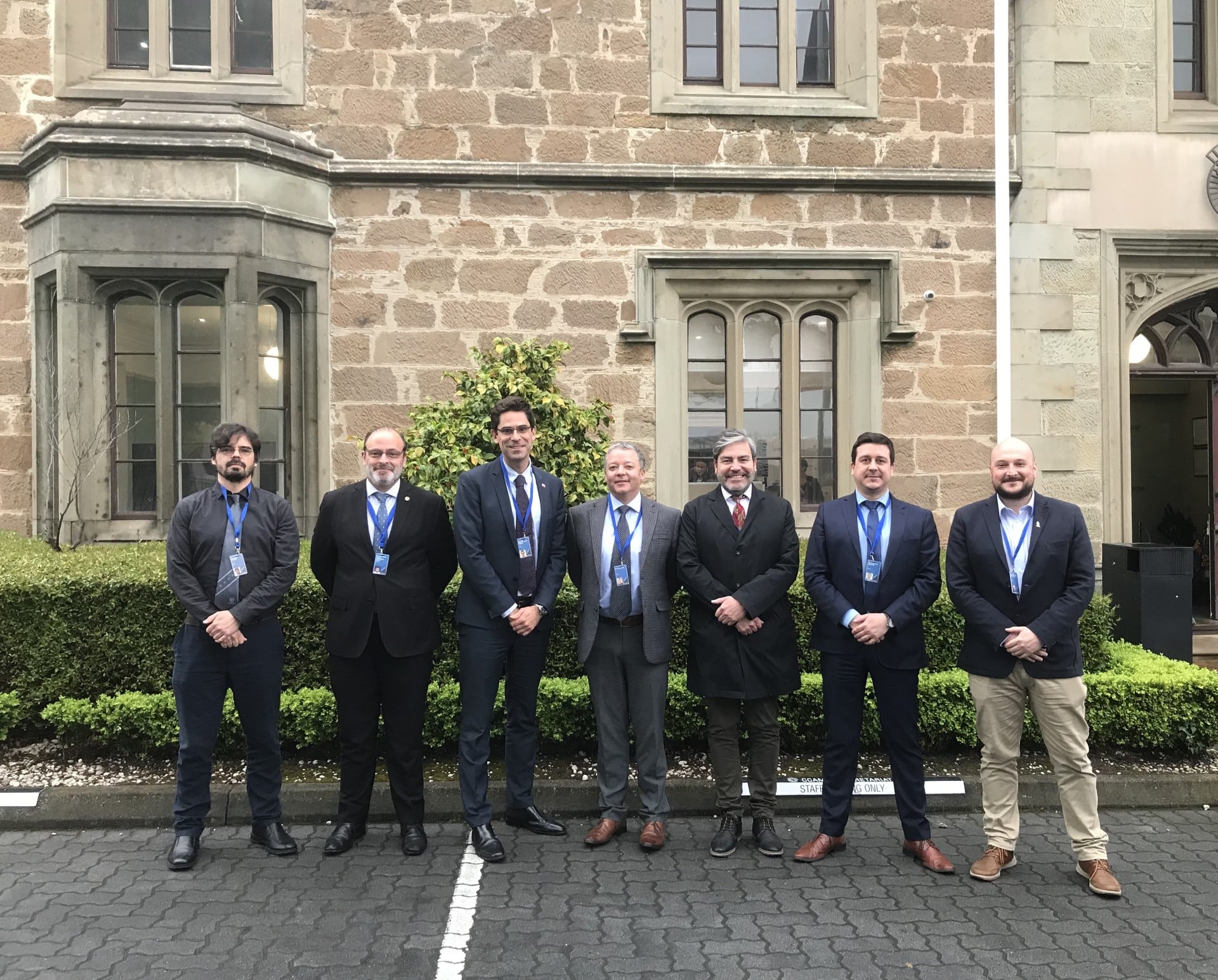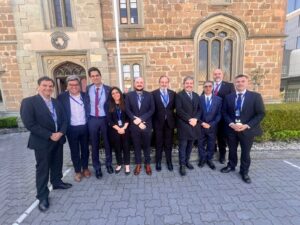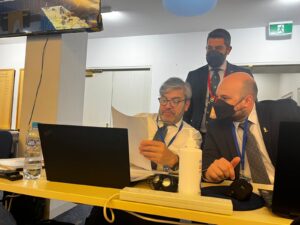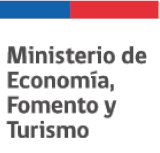

Between October 14 and 18, 2024, the 43rd meeting of the Scientific Committee of the CCAMLR (Commission for the Conservation of Antarctic Marine Living Resources) was held in Hobart, Australia. Dr. Carlos Montenegro Silva, Head of the Fisheries Research Division of IFOP, attended this meeting as a representative of IFOP.
The Commission for the Conservation of Antarctic Marine Living Resources is an intergovernmental organization established by an international convention within the framework of the Antarctic Treaty System. The Commission, assisted by the Scientific Committee, is responsible for the development and implementation of the necessary measures for the management and conservation of fishery resources and associated ecosystems in the Southern Ocean.
Currently, fisheries targeting Patagonian toothfish (Dissostichus eleginoides), Antarctic toothfish (Dissostichus mawsoni), icefish (Champsocephalus gunnari) and Antarctic krill (Euphausia superba) are being conducted in the Convention Area. These fisheries are managed using a precautionary approach, and management objectives seek to find a balance between conservation and rational use of resources and to preserve pre-existing ecological relationships.
The 43rd meeting of the Scientific Committee was attended by the following Chilean delegation:
- Juan Enrique Loyer. Director (s) Division of Antarctic Affairs of the Ministry of Foreign Affairs (Head of Delegation)
- Fernando Berguño. Ambassador. Ministry of Foreign Affairs
- Francisco Santa Cruz. Representative of the Chilean Antarctic Institute (INACH)
- Lucas Kruger. Representative of the Chilean Antarctic Institute (INACH)
- Carlos Montenegro. Head of IFOP Fisheries Research Division
- Luis Cocas. Undersecretariat of Fisheries and Aquaculture
During the 43rd meeting of the Scientific Committee, chaired by César Cárdenas of INACH, the results of the research activities of the national scientific programs of the CCAMLR Members were analyzed. In addition, the programs to collect the necessary data for the effective management of the Southern Ocean were reported, which include elements such as fisheries monitoring, scientific observers on board fishing vessels and programs to monitor the ecosystem and marine debris.
Additionally, the intersectional work of the five working groups of the Scientific Committee was reported, which are:
Working Group on Ecosystem Monitoring and Management (WG-EMM), Working Group on Fish Stock Assessment (WG-FSA), Working Group on Statistics, Assessments and Modeling (WG-SAM), Working Group on Fisheries-Related Incidental Mortality (WG-IMAF) and Working Group on Acoustic Surveys and Analysis Methods (WG-ASAM)

Part of the work agenda of the Scientific Committee included discussions on the implementation of a harmonization process to make compatible the development of a new fishery management strategy for krill with the adoption of a Marine Protected Area as a spatial and temporal protection tool. In this regard, Argentina and Chile presented a series of documents related to the scale of applicability of the harmonization process, a possible phased approach between subareas, the inclusion of temporary protection zones, new precautionary catch limits, an integrated data collection plan KFMA-D1MPA (Krill Fishery Management Approach- Domain 1 Management Protected Area) and some requirements for a review after a trial period for implementation.
In parallel with the Scientific Committee meeting, the SCIC (Standing Committee on Implementation and Compliance) meeting was held.
The following attended the SCIC meeting as part of the Chilean delegation:
- Juan Enrique Loyer. Director (s) Division of Antarctic Affairs of the Ministry of Foreign Affairs (Head of Delegation)
- Fernando Berguño. Ambassador. Ministry of Foreign Affairs
- Francisco Lértora, Representative of the Director of Borders and Boundaries of the State (DIFROL)
- Francisco Fernández. Fisheries Subdirectorate of SERNAPESCA.
- Luis Cocas. Undersecretariat of Fisheries and Aquaculture.
The purpose of this committee is to evaluate compliance with current Conservation Measures (CM) by the Contracting and adhering Parties, when appropriate, as well as to approve, through consensus of the Contracting Parties, proposals for modification and implementation of new CM. In specific terms, the main functions of the SCIC are:
- Review and assess the status of compliance by Contracting Parties and Adherent Parties, where appropriate, with conservation and management measures adopted by the Commission;
- Provide technical advice and recommendations on possible measures to promote the effective implementation and enforcement of conservation and management measures;
- Review and analyse information on activities by Contracting Parties and Adherent Parties, where appropriate, that undermine the objectives of the Convention, in particular illegal, unreported and unregulated (IUU) fishing, and recommend measures to be taken by the Commission to prevent, deter and eliminate these activities;
- Review and recommend priorities for improving the functioning of the System of Inspection and, jointly with the Scientific Committee, as appropriate, for the System of International Scientific Observation (SIO);
- Exchange information with the Scientific Committee and its subsidiary bodies, as well as with the Standing Committee on Administration and Finance (SCAF), as appropriate, on matters of relevance to the exercise of their respective functions;
- Make recommendations to the Commission regarding appropriate cooperation with Regional Fisheries Management Organizations (RFMOs), NGOs or other international organizations of a technical (e.g. INTERPOL) or scientific nature, aimed at achieving the objectives of the Convention, as well as on the implementation and enforcement of conservation and management measures;
- Perform any other functions that the Commission may assign to it in accordance with its mandate;
- Finally, prepare a report on its activities and recommendations, and an agenda for its next meeting, for the Commission’s consideration.
The SCIC examined a report submitted by Chile (CCAMLR-43/BG/33), which described the implementation of Electronic Monitoring Systems (EMS) used in our country, with the purpose of controlling discards and bycatch, as well as other fisheries regulations. SCIC thanked Chile for its paper and supported the recommendation that an intersessional electronic group be established on the CCAMLR discussion platform, in order to facilitate the participation of Members and Observers in the development of a work schedule, guidelines and standards for an EMS to be adopted, through an ad hoc Conservation Measure, by CCAMLR. Document CCAMLR-43/BG/33 Rev. 1 contains a draft of the terms of reference for the establishment of the CCAMLR discussion platform. This proposal was presented to both SCIC and the Scientific Committee, receiving widespread support and congratulations from their members.
In parallel to the meetings of the Scientific Committee and SCIC, the SCAF (Standing Committee on Administration and Finance) meeting was held, which provides the opportunity to address administrative and financial aspects of the issues to be considered by the Commission.
The following representatives joined the National Delegation at the 43rd meeting of the CCAMLR Commission, which took place between October 21 and 25, 2024 and in which Dr. Carlos Montenegro Silva of IFOP also participated:
- CA Nelson Saavedra, Director of Maritime Interests and Aquatic Environment of the General Directorate of Maritime Territory and Merchant Marine.
- Juan Francisco Santibáñez. Head of the Fisheries Development Division, Undersecretariat of Fisheries and Aquaculture.
- Gonzalo Rojas. International Affairs Unit of SERNAPESCA.
- Héctor Bacigalupo, President SONAPESCA.
- Valeria Carvajal, President FIPES.
- Enrique Gutiérrez, General Manager Pescachile.
Among the activities carried out by the members of the Chilean delegation in the various scientific and technical Committees, the following were highlighted:
- The presentation of the eGroup for Electronic Monitoring
- Presentation of Marine Protected Area Domain 1
- The active participation in the evaluation of compliance with the various Conservation Measures by the
- Contracting and adhering Parties, as well as the discussion generated regarding the new Conservation Measures and improvements to the current ones.
- Conversations to prepare a proposal for research fishing in areas 48.2 and 48.3A.
Despite a year of tentative negotiations, CCAMLR members have failed to reach consensus on: (i) the creation of new marine protected areas, (ii) the renewal of the spatial fractionation of the quota established in the Antarctic krill fishery, and (iii) the establishment of a Patagonian toothfish quota in area 48.3. Growing commercial interest in krill fishing has prevented concerns about the impact of climate change on regional ecosystems from being met and prevented the 27 CCAMLR members from reaching an agreement on the issue. On the above, during the meeting in Hobart, some countries vetoed the Chilean-Argentine proposal for the creation of a new marine protected area (MPA) in the Western Antarctic Peninsula (Domain 1) and blocked the renewal of Conservation Measure 51-07, which distributed krill fishing activities within designated subareas of the extensive krill fishing zone, as well as the Conservation Measure that established a quota for deep-sea cod in area 48.3.
Finally, one of the most notable aspects of the participation of the Chilean delegation at the 43rd meeting of CCAMLR was the representation of all sectors involved in the topics of the meetings, with a strong participation of the institutions of the State of Chile, the industries that have fishing interests in the waters of the Southern Ocean, as well as the interaction with international organizations such as FAO, UNDOALOS, IUCN, IWC, ASOC, ACAP, Mission Blue, COLTO, SCAR, among others.




